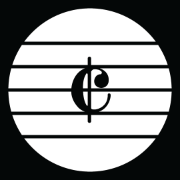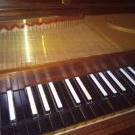Leaderboard
Popular Content
Showing content with the highest reputation on 12/14/2023 in all areas
-
Hi @SergeOfArniVillage, This is surprising to me, since I know how good you can to compose piano music but this is your first multi-movement work? I agree with Peter on the Gesulado-like nature of the introduction and I love its advanced progressions. The 1st theme is well orchestrated and I love the energy. I really love in b.21 the struggle between F minor and F sharp minor continues. The introduction to the A major theme is nice, and I love all those suspensions. I feel like the transition to F minor beginning of the development a bit abrupt, but I love all those hand crossings (I have similiar passage in my sonata movement which you love haha!) I love the late burstout of the movement, but maybe my Sonata mindset is too stubborn so I think the movement ends a bit too early. For the 2nd movement it's sad the pedal cannot hold for long in the midi. I love the contrast of dynamics and movements here, but the hand crossing is still present to mix up the texture, especially the bells in b. 34. I love the 3rd movement with its relative simplicity of harmonic languages comparing to the first two movements. The phrase in b.15 is quite Hungarian. I think the phrase in b.63 can be played by two hands. What does the "quasi second voice" in b.77 means? The harmonic progression is great there though. I think you can vary up a bit for the b.75 section since the pattern doesn't change for 25 bars which is fourth of the movement at that time. Beware of those RANDOM pauses LoL!! Thx for sharing! Henry2 points
-
I think this is excellent. I look forward to the rest of the movements. While I think everything's well written, there's several lovely moments in this piece that stuck out to me in particular: -- bar 51 morphing into bar 52. It feels almost like the tugging, and then rattling of a chain. A very striking sound effect in context. -- bars 107 - 114 I love how the hand crossing over to the bass adds a certain textural contour. It reminds me of something ... molten and steely, yet smooth. -- bars 144 and 148 and 157. The pauses are great. I noticed the YouTube commenter who complained about how bad and random the pauses are, and then he completely undermined any semblance of his own credibility by saying it "objectively ruins the form" or whatever. But in so doing, his ignorance provides an excellent life lesson that transcends music. It just goes to show, not everyone's viewpoint is worth considering, and there are times it's appropriate to simply ignore criticism that flies in the face of good sense. Just as there is good and worthy criticism from people who seek to provide different viewpoints to enrich a person (for no one knows it all), there is criticism that exists for the sole purpose of tearing down and making oneself feel superior in one's own imagination, and what value is there in it? That individual clearly has a LOT to learn, and he will only achieve it if he ever learns the wisdom that comes with humility. Thanks for sharing, Henry 🙂2 points
-
Greetings. It has been a while since I posted something on this forum. I didn't get to review compositions by other members lately due to being busy with my studies, and I'm sorry for that. Anyway, a few weeks ago, I decided to write a theme and variations for the piano. This was my first time writing music with this structure, but it was not because I lacked inspiration. I took it as an exercise to boost my creativity and improve my composition skills. This eight-minute-long piano piece, written in E-flat major, is one of my major works. It consists of a theme, five variations, and a short finale. These variations are based on a simple theme I created, which I finished within a few hours. On average, each section took me a day to complete. One difficulty I faced when writing this composition was to keep the material interesting while not being too distant from the theme. Here is the breakdown of the structure of this composition: Main theme (E-flat major, Maestoso, 6/8): It's an operatic yet simple theme, which opens forte and Maestoso. 1st variation (E-flat major, 6/8): This variation is a berceuse with grace-note embellishments in the melody and frequent hand-crossing. 2nd variation (E-flat major, Più mosso, 6/8): This playful variation features sixteenth-note figurations in the right-hand part. 3rd variation (A-flat major, Sostenuto, 6/8): This variation is a serenade and the slowest among the five variations. This variation ends with a long pause, marking the beginning of the fast section towards the finale. 4th variation (E-flat major, Vivace, 6/8): This variation is partly inspired by the third movement of Beethoven's fifth piano concerto. This fast section demands virtuosity and contains a short cadenza passage. 5th variation (E-flat major, 2/4): This variation is an étude featuring rapid triplets in the right-hand part. This section is the shortest among all variations, lasting under a minute. Finale (E-flat major, Presto, 6/8): The finale opens with tremolos and a horn-like passage restating the main theme, followed by a reprise of the fourth variation at a much quicker tempo, quickly concluding the piece. Let me know what you think about this piece. I hope you'll enjoy it! Carl Koh Wei Hao P.S. The audio was generated on MuseScore 2.3.2.1 point
-
This is the first Sonata I've written. I've attempted to write music with multiple movements in the past, and have always struggled with it. I decided to give it another shot, and this is what I came up with. Let me know what you think: comments, thoughts, criticisms all welcome.1 point
-
Hi everybody! This is my concerto for clarinet and band! please feel free to share your thoughts!1 point
-
Hello! I decided to join in the ongoing event...It's my first one since joining this forum! With this piece, I had originally started it just to play around but really liked where it was heading and decided to turn it into a fun little piece that in my mind, it the backdrop to a busy toy workshop in this holiday season or perhaps some holiday hijinks. As the usual, this is made in FL Studio using a combination of Spitfire Audio VSTs (both paid and free) and this time also Amadeus Symphonic Orchestra. It was an early idea in the making of this to use the sleigh bells to signify a change in the piece. I really tried to embrace some different vibes with this song than I usually do! Hope you enjoy the song and have a great holiday season! The Busy Workshop.mp31 point
-
I left a comment on youtube but I thought it was very skillfully written in addition to taking a lot of pianistic ability to play1 point
-
@PeterthePapercomPoser thank you! What you said about writing sonatas putting your weaknesses on display is so true. It really taught me a lot about tightening my writing so that it doesn’t just go all over the place. @Henry Ng Tsz Kiu thank you! Yes, this is my first multi-movement work. I mean, I have written multi-movement works before, but this is the first one that came out unscathed 😂 everything’s a learning experience! About the “quasi 2nd voice” note, that was just something I wrote down when I was figuring out how I wanted to develop that section. The accented note there and following accented notes felt like they were somewhere between “just a harmonic note” and an actual 2nd voice with a full quarter note stem, which I thought was interesting. But I just forgot to delete the comment, it wasn’t supposed to be on the score. I’ll delete it later, when I clean up the test of the score, since some parts are still messy. ”Beware of random pauses!” 🤣 My God, it feels like a new meme has been born! That’s hilarious. Thank you both for dropping by and commenting, I appreciate it.1 point
-
Hi Zach, Thx for your review and appreciation! I enjoy it very much! Yeah this features a lot in your own sonata! Actually I really don't care. I respond him merely to provoke him so he will be "infatuated" and respond to me and so the video can earn more exposure LoL! I have you guys who are all very knowledgable musicains and composers respond and review my pieces which I deeply appreciate, so I won't care the self-proclaimed genius's view on YT. Let him continue to think himself greater than others, since at last he will be the one who suffer. I am afraid it will be long time after 🤮 I did finish the first draft of the 2nd movement but yet to modify it or have my hands to play on it; 3rd movement I just have the beginning theme... Thx very much! Henry1 point
-
Greetings. This will probably be my last piece I will share for the year. I composed a little suite of sorts of adventure film music inspired by the works of John Williams and Jerry Goldsmith primarily. Adventure movies happen to be my favorite kind. It's over 4 minutes, so none of you better tell me it's too short this time lol. But seriously, let me know what you think of it.1 point
-
Hi Zach! You have quite adventurous harmony/modulation at the introduction of the 1st movement! The exposition does settle down into the key of F# minor however, with the 2nd theme (at least starting) in A major. Then, the development effectively visits the key center of F minor before returning to F# minor once again, just like the introduction and 1st theme. The bittersweet stillness evoked by the 2nd movement is a great contrast to the intensity of both the 1st and 3rd movement! And there is thematic unity between all 3 movements which is hard to pull off without seeming like you're just repeating yourself. The 3rd movement is by far my favorite of the 3. It's like some kind of rondo-scherzo form or something with variations and details added each time you return to each of the ideas/themes. I think your transitions in this sonata are quite solid imo. I think I find the task of writing a piano sonata so daunting because it's so raw and all your weaknesses get put on display, and I don't want to find out that I'm not good at transitions. Then again, I've also developed a variation technique that might help me with that. This movement is very cohesive and organically unified with the other 2 movements. Congrats on this achievement! Thanks for sharing. Peter1 point
-
Wow. You've really made something incredible here. As Henry mentioned, this piece is bursting with color. I don't know how you managed to coax such beautiful colors from these sounds samples -- you deserve better software, because currently, it's a bit like looking at a sepia-filter photograph of a rainbow. The colors can be made out, but they are "duller" than they should be. I'm looking forward to this piece getting a sound sample facelift when you have an opportunity. When it comes to virtuosic writing, a good rule of thumb is, "is it necessary? Does it serve the music?" For example, you mentioned Liszt's Mephisto Waltz. On occasion, Liszt got carried away with his writing 😂 but his Mephisto Waltz No. 1 is an excellent example of mature virtuosic writing. The slow section in the middle with the repeated R.H. notes and octave achieves a "warble" that adds a certain eeriness and mystery to the piece that couldn't be achieved otherwise -- the virtuosic passage serves the music. Those infamous R.H. octave leaps just before the explosive finale -- not only are they visually impressive to the audience, but they provide a thin texture that's immediately contrasted by the deeper, thicker chords that he wrote between those leap sections. In other words, all of the virtuosic writing served the music. So, my advice is, as long as you make sure that your virtuosic writing serves the music, and isn't made the point of the piece in and of itself, your music will come across as mature are well-founded. This piece you've written, for example, for the most part, comes across as written for the sake of making music -- as it should be. It's exciting, passionate, colorful, unique ... and the virtuosic writing adds that element of "daring" that couldn't be achieved another way. However, I'm willing to bet there are certain passages that could use some refinement. Try turning it into a game -- a game of, "how do I write this passage in a way that most works in harmony with the natural mechanism and movement of the hands and fingers?" That's something that's really helped me with my writing. I hope my ramblings made some sense. Thanks for sharing, I really enjoyed this!1 point
-
I would just keep it on one note at a time. I guess the material that the piano is playing there is in the character of background material so that makes sense!1 point
-
It's just a very good piece of music, excellent scoring and rendering. The contrasting episodes were superbly timed. Accomplished. I think I've said it before: you obviously know what you're doing. It might well have been a recorded live performance. Although I'm rarely interested in film music this piece very quickly proved it could stand alone. It would do well as a concert piece.1 point
-
I find it funny how this video weaseled it's way into my youtube feed the day I see this post. I agree with the above opinions. When dealing with people in the music "biz", I've noticed that there are a lot of talentless people praying off of talented ones. It seems as though these same people try and mix as well. I think the most helpful thing I could offer is to get to know as many people as you can who work with music. You'll eventually be able to separate the ones who live for music and the ones that leech from it. Once you find the ones worth working with, things tend to be happier all around. I guess that's all obvious 😄 Also, a technical quagmire is my favorite description I've seen in a while.1 point
-
Won't help that I can only add to the rant. I'm no expert so I can't pretend to compete with tradespeople who spend their days in front of this equipment. Not yet but I'm getting there. But I think the marketing of this digital music gear is laden with the stuff that comes out of the north end of a southbound bull. I read the bleats of these sample houses. Buy our product and you'll be the greatest composer since forever. The naive and gullible fall for the patter. Firms turn it into a Lego kit: instant orchestration...join a few bits together, press the button and hey presto! You have a masterpiece. They've turned an art into a nursery school plaything. I've heard about these mastering/mixing outfits...but I ask at the outset: how can these commercial geniuses (genii?) know what the composer is trying to achieve without him/her sitting there beside them; and, is it even necessary? Sure, it's a learning curve but if someone's going to dabble with digital music, they've got to learn. It takes time and experience. And intense self-criticism, doesn't matter what genre one's working in. By falling for dependence on these commercial crutches they learn nothing. But I have a jaundiced view of musical education generally aside from technical/digital. (As a hobbyist I work at the electronics end of it.) Degrees in composition are a self-perpetuating cash cow. They can't teach creativity. About 1‰ becomes composers; a few, teachers and the rest get into a different trade/profession. They've turned "theory" into a technical quagmire that doesn't prompt creativity. Analysis is only useful to find out how something is done. I suppose they can promote the musical 'hack' by making people compose to order. As Elfman says, these days film music is corporatised...copy and paste hacks to me. So be it.1 point
-
To add to Vince, in my opinion, music doesn't always have to be original. But I want to emphasize that I actually enjoyed your "Beethoven-esque" sonata more than a lot of Beethoven's own sonatas! That is tremendous value to any listener, even if it is of a similar style. And Henry, as I go through your piece and notate it carefully in Music Jotter, I am truly appreciating how very rhythmic this piece actually is. I had to take a day off from scripting my next video which will be 100% dedicated to you, because I had to fix a few things while I was notating! Your piece also inspired me to create custom note spacing, sooner than later. The reason for this is because some of your voicing has spacing that does not overlap notes (which is a Music Jotter default), but is spaced a bit to the right. I'm not sure what my video will be about yet, but I have some ideas. I will see how much of your piece I can actually notate in Music Jotter, then I may try to record parts of it in midi.1 point
-
Hello there So, this is going to be a weird review. It's because I like your piece a lot, and you're an outstanding performer. And the crux of this comment is not about good or bad, but you and your goals and decisions as a composer. First of all, yes the audio isn't that great. Yes I know you know that. Yes I'm the same way, I care mostly about the notes themselves and the performance. Yes sharing your recording here of all places is absolutely acceptable (hell it's better than any midi), but what others have said rings true about quality being very important. I'd say it's something to invest in, but if your situation doesn't allow you to freely record yourself in some optimal way... do what I do. Just go to a studio and have them record you. It's worth all of your hard work and time you've invested into your own music. Trust me, music production is a lot to learn, and you can do it, as can I. But if you're anything like me, learning a bunch of nonmusical nonsense in home recording is tedious and boring. If you're up for it, great. Go full throttle because it IS worth learning. But I don't have the time or money to care as much as some others who really enjoy the craft and dedication it takes. I'm amateur at best, and I'd rather devote my time to practicing my instrument and pure composition rather than mixing and engineering. You're a smart guy, you work a nice job and make a decent living. You're single, yes? No kids? Damn son, save that money for studio time! That aside, I'd like to mention that I thoroughly enjoyed this music. As always, you continue to dazzle us with your great performances (throw away the humility of pointing out your mistakes to us. It's not as bad as you think, your performances are always very impressive). You continually display a brilliant understanding of the studious aspects of music. Sonata form has become your bitch, and your craftsmanship of motivic development is something that anyone aspiring to better themselves in composition could learn from. There's nothing to say that's "wrong", or that the technicality of your music falters by sentence X of page Y in theory book Z. At least not that I heard... but that's kinda my point of this post... we'll get to that. I love that you just poured your heart out into this. You let your emotions take the reigns and dictate your every move. It sounds raw to me, like a primal rage kept in check by your studies and skill as a composer. I listened to this a few times, and after the first, I took off my composer hat and just let the music take me wherever you wanted it to go. Henry, you ARE a fantastic pianist. This is more personal to me, and not really the point of anything I'm saying in this comment, but I adore every time you mention your students, or any time you talk about being a teacher. As you know, I've done the same, and there are so many times where I catch myself learning new things and thinking about an aspect of music in a new way simply by reinforcing my knowledge or experience to someone else. The detail you give your performance (and other pieces of yours!) is something to admire. Sure I play piano a bit, but guitar is my main instrument. And the care you take with your precision and desire to let the musicality of your music flourish is something that I've taken from listening to your music. You'd be surprised to know that there have been times when I record myself and think, "yeah, that's good"... but then re-evaluate. It wouldn't be good enough for Henry. Gotta do it again. It's better that way 😄 If you're going to immortalize your music with your own recording, make it perfect (as in the performance, not the audio haha). So... anyway...................................... I have to say this. I really do. You're brilliant, and deep down, you know you are too. It's so obvious to me that you've studied music composition with great love and care. You've found a passionate bond with music, especially with your favorite composers. You wield the torch of the great romantic composers, most notably the one who created the era. Beethoven is one of my heros, as is yours I know. I can tell with great certainty that you've dissected and absolved all the information and knowledge you could receive from his music. IN FACT, although this changes over time, I'd say for the past 10 years or so Appassionata has been my favorite sonata of his. Of course you know that one. I can tell from listening to your piece. There are many things that reminded me of this, as well as Beethoven's "style" in general. I wouldn't say your sonata movement is the same as Herr Beethoven's music, but the way you treat material is a lot of times. That's not wrong or bad, but when you get feedback that says, "this reminds me of Beethoven", or, "you need to broaden your harmonic language", I think it stems from this. There are lots of examples that make me think this; this quest for originality is difficult. For instance, the popular band Polyphia is very famous for their technicality, but the harmonic language and treatment of developing material is pretty standard (sometimes annoyingly novice IMO). So what sets them apart? It can't just be the technology and effects of 2023 instruments and guitar pedals. They wouldn't be as admired. Or what about Beck? Or Primus? Or any band or musician that has made themselves revered and their music loved? WHAT IS THE SECRET??!!!?! Or to simplify my point, what was it about Beethoven that we still listen to and study his music in the 21st century? His Piano sonata no.2... is that not Haydn influenced? Tinges of Bach and Mozart for his Minuet in G? What was so great about him? He was learning and discovering who he was, not only as a man but as a musician. He learned from the greats of his day, just like you do. But at some point, he abandoned the framework of the masters he learned from and decided to give the world a new flavor. A flavor he crafted and that was his own, and he didn't ask or take a poll with everyone to see if it was what they wanted and liked. People don't know what they want or like, you have to amaze them. Beethoven, known as a brilliant improviser and brash emotional musician, started his first symphony (is he not known for being one of the greatest symphonists?), at the age of 29 or so, with a C7 chord to F. It's in the key of C. He purposely lead the listeners ear in another direction to give ambiguity, right at the start. Isn't that cool? In the year of 1800? Idk, stuff like that really makes me respect him. And it's because he used the absolute fundamentals of music to be creative, not timbre or effects. The point is, I feel like it's WHAT he was thinking regarding music theory that would be cool and interesting that's so impactful. Think of the French hearing Stravinsky's Rite of Spring for the first time. Who cares what the outcome of that performance was, he transcended time and knew his music was meaningful without caring what the perception might be. Debussy's Prelude of the Afternoon of a Faun... he was 32! Was he an accomplished pianist and musician? Absolutely!! Was he thinking about the creative use of the lowest flute register? Uh, probably! And just like you, he dedicated so much time in getting better at his craft. Do you know Jimi Hendrix? Watch footage of him as a black man playing electric guitar for a bunch of hippie whiteys. So many moments of awe, as normally you'd see people dancing and banging heads, but instead a look of wonder and perplexity consumed them as they witnessed a wizard. How did he get that original? Well, he grinded the Chitlin circuit, and learned from the masters, just like Beethoven, just like Polyphia, and just like you. So to anyone who says your music isn't original... just wait. In a few years time, you'll continue your craft, you'll get better, and you'll continue to explore that inner voice you have that keeps you going until you not only make a mark on the world of music, but you'll craft a scar. It'll be unremovable and originally yours. To summarize, this is fantastic music, but more importantly, I'm excited to hear your evolution as a composer, musician, performer, and friend. You have immense talent and an unfathomable love for music, yet the greatest attribute you have in my most humble opinion is your craving to help those around you. It's already a given that you're an outstanding musician and will grow to the greatest heights of craftsmanship, but your larger than life heart will take you farther than you realize. Thanks for sharing, this was a joy to hear, and well done Henry 🙂1 point
-
I agree with Peter - while this piece is clearly original, the harmonic palette isn't as fresh. Besides that, this piece is perfect. I especially enjoyed listening to your primary themes within the exposition, such a beautiful melody. Your Development was quite nice as well. You are a wonderfully talented pianist-composer and this piece does both of those titles a great justice.1 point
-
Hi all, Thx for all your reviews! I will reply them one by one (to earn more exp LoL!) Henry1 point
-
Regarding this, I personally don't mind conservative harmonies. I know I said this in one of my videos, but good harmony doesn't necessarily mean, who can create the craziest and most unique harmonies in a piece. I think that crazy harmonies may actually ruin this piece, just given its style. One of my complaints around composers who try to get too creative with their harmonies, is that the overall piece sometimes starts to lose its meaning. In my opinion, use harmony where applicable. In a piece like this, the tamer harmonies are ok in my eyes, simply because the rest of the piece has other elements to give it color. One instance of this is the polyrhythmic section which is one of the most beautiful sections of this sonata. Perhaps the phrase may contain basic harmonies, but the clean harmonic structure makes the phrase easy to follow. And don't forget the melody. Melody is probably one of the hardest aspects of composition, and I do think Henry excelled in that area. Interesting, because I recently listened to nearly all of Beethoven's sonatas, and I find that most of them are not really lyrical. Some exceptions would be Moonlight Sonata, and perhaps Pathetique. But Henry's sonata is perhaps neo-romantic. I found myself enjoying this 1st movement sonata more than a lot of Beethoven's 1st movements. I'll have to give Schubert a listen one of these days.1 point
-
There's nothing to criticize with this piece, other than the audio recording quality. It sounds like I am listening to a modern Beethoven who had some inspiration from Chopin. I hear slight hints of Chopin's first sonata, but other than that, this is your own voice. In fact this piece is much better than Chopin's 1st sonata. You have a gorgeous melody going on here which helps boost this piece's listening value. In fact, a lot of Beethoven's sonatas aren't as lyrical as this one. I found myself playing this theme in my head all day today (due to me listening to this piece like 4 or 5 times last night). I also had no idea you were quite the pianist either. Don't worry about the missed notes, it's more about the overall playing, and ability to convey the message clearly. Really the only thing missing here is the sound quality, because everything else is perfection. I might have to do a dedicated video of this piece on my YouTube channel, because this movement really captured my interest. I may experiment with recording parts of your piece in midi, to see if I can help bring out the clarity of some sections. And since you compose in polyrhythms, it's really a perfect study because I can demonstrate how Music Jotter can use the polymeter to score certain sections of this piece. What we have here is an expertly written composition and well executed performance. May I ask how long it took to compose this movement?1 point
-
Hey @Carl Koh Wei Hao, Welcome back! The theme for me is quite like a Chopinistic waltz in 6/8 time, but not too operatic for me. The change of touch to appoggiaturas in variation 1 adds grace to the theme, good job on that. But maybe it will be hard for the pianist to discern the original theme since it is hidden among the appoggiaturas? The 2nd variation reminds me of the second movement of Chopin's third piano sonata, also scherzando in nature and also in E flat major! I love the texture of 3rd variation. You make good use of the arppeggios and the texture there is flourish and harp-like. And the change of articulation in 4th varaition is funny! I am sure the etude can be played but it's very hard to capture the lightness of it! Weirdly it reminds me of the final movement of Berlioz's Symphonie Fantastique when the witchy theme reaches E flat major there. But I also really feel the 3rd movement of Bee's 5th Concerto here, not to lie! I am sure you have taken Chopin's op.10 no.11 into consideration in the 5th variation with similar texture (and the same key!). The finale is very successful when you introduce the Naepolitan and flat submediant keys here, pushing the piece to climax! I may wanna have some variations set in the minor keys or at least in different keys, other than the only variation in A flat major. But still this one is very enjoyable which showcase virtuosic skills and light style in romantic language. No need to feel sorry about that. There are bunches of people here who only post but never review, or don't even reply to other members' review on their own works, and you are for sure treasured here on YC! Thx for sharing this enjoyable piece! Henry1 point
-
This one is for sure the hardest among the whole set. A Waldsteinian accompaniment, energy and tempo, moments of syncopation like in no.7 and 9, use of hook accompaniment as in no.9, heavy chords as in no.8, imitations, lento section reminds me of no.1 and raindrop prelude, and the longest one with page number matching the prelude number, all these make it the most difficult one of the set. Stlll I enjoy playing this very much. This one as @SergeOfArniVillage said looks like the real finale of the prelude set with the elements in previous preludes reappear (and being the longest), while no.11 is an introduction to the postlude no.12. Thx for giving me a chance to play your preludes, I really learn through each of them by playing them since I won't be able to compose any of these preludes and you teach me new things with them. Henry1 point
-
This patron has been rather disappointed in the community response to this particular competition. Young Composers Forum (YCF) is intended to be a place where budding composers from all walks of life can grow in their craft alongside their peers. We have always welcomed those who are willing to listen to the feedback of their peers, and we have always encouraged those who post for the sake of adulation and admiration to find other outlets for their arrogance. The competitions we host are no exception to the vision of YCF. They are not intended to be "professional grade" competitions, although we do strive to make them as robust as possible. No, their primary goal is to provide a space for the YCF community to be able to grow, exercise what they've learned, and have the pleasure of sharing their music with others. We, the staff, decided to offer prize money as a way to give back to the YCF community, to thank them for their contributions and hopefully to draw in more and likeminded composers. We unequivocally welcome such people into the YCF family. This competition, unfortunately, has not produced that effect. There has been a pervasive sense of entitlement that is, quite frankly, not very becoming of our community. We, the judges and staff of YCF, are not getting a single cent of compensation for our time in judging this competition, nor for any of the other services provided for this community. I have been extremely discouraged by the behaviors and comments of some of the entrants, who have challenged the culture here at YCF and threatened it with elitist, materialistic ideals. I do not wish to see the beautiful thing we have fostered together here wither away under such ideals. (That said, we welcome feedback on how to improve these things, but please bear in mind that such feedback is better received if it comes from someone who has also invested in the YCF community, such as an active YCF member.) In closing, I would like to remind you that a competition is to be enjoyed by both judge and entrant. I have not enjoyed the competition this time around, and earnestly hope that future competitions will once again reflect the culture at YCF. Respectfully, Jörfi1 point







.thumb.png.8b5b433a341551e913a34392660bc95b.png)

